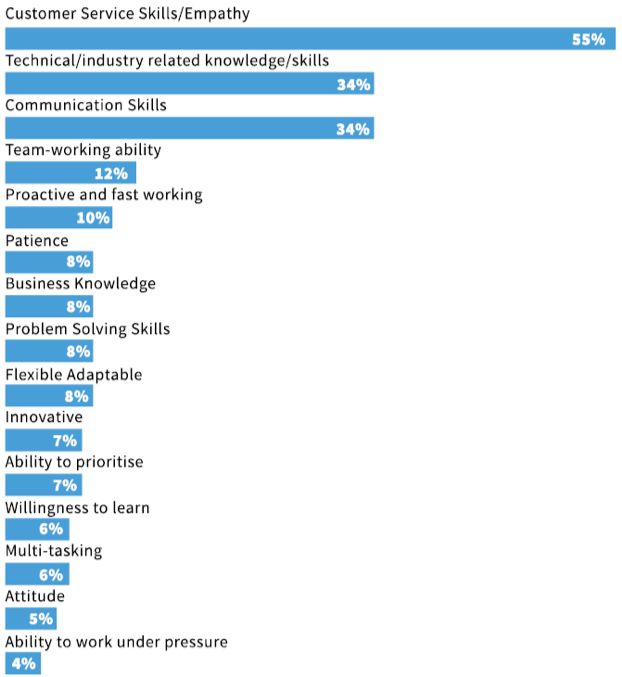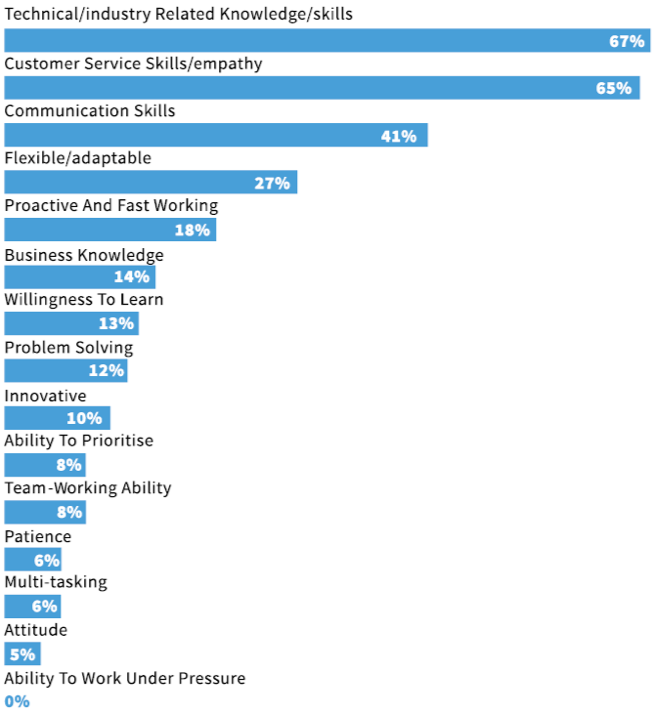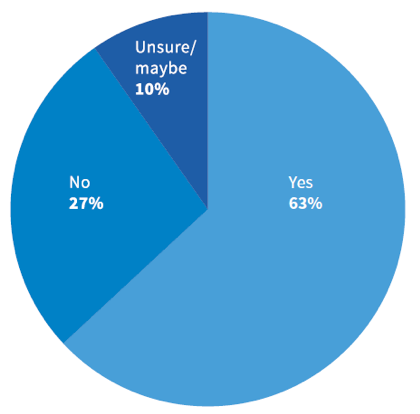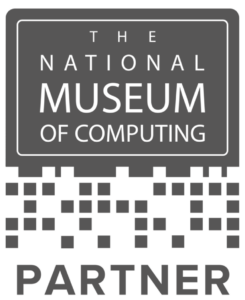The role of the service desk analyst has evolved overtime; it has grown from a non-technical role some 30 years ago to a role where, according to SDI research, the second most important skill is currently technical or industry related knowledge. With new automated, Artificial Intelligence (AI) and Machine Learning assisted technologies, like chatbots and virtual agents, becoming more commonplace, the responsibilities and skills required of an analyst will undoubtedly continue to evolve as these technologies take over IT’s low-value and repetitive tasks.
In the SDI Analyst 2.0 report, we asked service desk professionals what they thought the most important skill for service desk analysts is now and what it will be in 3 to 5 years’ time.
What do you consider to be the top 3 key skills/attributes currently required of a service desk analyst?

What do you think will be the top 3 key skills/attributes required of a service desk analyst in 3 to 5 years’ time?

We can see that technical skills are expected to be more important than customer service skills; as a predominantly customer-facing role, this may seem a surprising statistic. However, it makes sense if we consider the fact that increasing use of channels like self-service and chatbots, and the adoption of Shift Left initiatives, customers now have less contact with a physical service desk analyst. Therefore, while it will still be important to have customer experience skills, the analyst in 3 to 5 years’ time will most likely be spending more time carrying out more technical tasks as opposed to dealing with customers directly.
Following on from this, the importance of an analyst to be flexible or adaptable will also increase significantly in the near future. Coupled with a willingness to learn, service desk professionals appear to believe analysts will need to adapt to new technologies and their evolving environment.
If we compare a service desk analyst’s job description from 2015 to one from this year, we can see how the role has developed in just a short space of time.
| 2015 | 2018 |
| Provide 1st and 2nd Line support | Acting as a single point of contact (SPOC) |
| Incident management and service request experience | Management and resolution of incidents, problems, and service requests reported to the IT service desk in line with service level agreements (SLAs) |
| Excellent communication skills | Take ownership of problems and communicate on progress |
| Deliver a high level of customer service | To maintain a high degree of customer service for all support queries and adhere to all service management principles |
| Use of service management tools | Escalate issues when required |
| Provide ‘How do I?’ support for end-users | Potentially act as a Subject Matter Expert |
| Contribute to the continual improvement of the environment | Assist with trend analysis |
| Preparation and support of hand-held and mobile devices | Contribute to the dedicated knowledge base |
| Involvement in a variety of ad-hoc projects | Participation in audit activities related to the incident and problem management process |
| Willing to constantly enhance own knowledge and actively share that knowledge with others | Identifying and recommending cost reduction initiatives where relevant |
2015 Source: The Evolving Role of The Service Desk Analyst
2018 Source: Avocet Recruiting
Analysts are now expected to take on problem management responsibilities. Strictly speaking, the service desk doesn’t deal with problem management. But the incident and problem management processes are intrinsically linked, so it makes sense, for analysts to take on more proactive roles. So, is this a reality now? Are analysts now expected to take ownership of problems and communicate on progress and assist with trend analysis? The short answer is yes. SDI data shows 63% of service desk professionals are already seeing analysts spending more time on problem management.
Have you seen a shift of analyst time spent more on project/problem management?

This could suggest that self-service and automation is already having a positive impact and reducing the amount of time analysts spend on basic, repetitive tasks, meaning they have time to become more proactive and to take on more valuable tasks.
So what could the role of a service desk analyst in 2020 look like? We have mentioned that technologies which take on the repetitive and time-consuming tasks from analysts frees up their time to focus on more valuable tasks; these tasks could be things like assisting with problem management or something more akin to 2nd line support, which would potentially require training to develop their skills and capabilities. This could mean that a job description could focus more on specific areas of service or products, or data analysis skills to spot trends in performance reports and identify issues before they impact the service.
Alternatively, the analyst role could become more customer-focused. For example, analysts could spend more time reviewing customer feedback data and identifying areas of the service which need improvement. Recent SDI research has shown that of the 21% of service desks that do not measure customer satisfaction, the largest proportion (30%) stated this was due to insufficient resources. If analysts are able to spend more time focusing on customer-centricity, then the service’s efficiency may benefit as a result.
Want to know more?
The future of the analyst role will be the focus of my presentation (5pm on 19th November) at this year’s itSMF UK Annual Conference (ITSM18); where I will explore how the role of the service desk analyst will evolve, including what skills will be necessary for the Analyst v2.0. Furthermore, I’ll be discussing what this means for the service desk, and how emerging technologies will shape how it will look in the future. So if this sounds of interest, please book yourself a ticket and come along to my session.



